General characteristics of the grounds for dismissal
The fundamental reasons for termination of an employment contract are discussed in Chapter No. 13 of the Labor Code of the Russian Federation and its nine articles numbered 77–84. It is here that all the key information about legal dismissal is concentrated, the framework grounds for termination of the contract are indicated, that is, the reasons and situations applicable to each employee, regardless of his status.
The first on the list - Article No. 77 of the Code - classifies the main circumstances for severing employment relations. If we go from the general to the specific, we can conditionally divide all the grounds for termination of employment relations into 4 groups, based on the main reasons for terminating the contract:
- Dismissal by mutual agreement between the employer and employee - Article No. 78 of the Code - agreement of the parties.
- Termination of contractual obligations on the initiative of one of the parties to the labor relationship, be it the will of the organization or the desire of the employee - these grounds are regulated by Article No. 80 (dismissal at will), Section No. 81 (at the initiative of the enterprise). And also an article that is not included in the block of the thirteenth chapter, but actually reflects the interruption of relations with one of the employers - article number 72.1 (movement).
- The third group includes the main reasons that suggest the impossibility of prolonging labor ties, for example:
- expiration of the contract term (Article No. 79 of the Labor Code of the Russian Federation - termination of a fixed-term agreement);
- situations that do not depend on the will of the parties (section No. 83 of the Code - conscription into the army, arrest, etc.);
- violation of norms when drawing up a contract (Article No. 84 of the Labor Code of the Russian Federation).
- Situations when a person refuses to continue an employment relationship for health reasons, unwillingness to work in another city, when working conditions or the status of the enterprise change (Article No. 72.1, Section 73, ,).
If we consider in more detail all the grounds for termination of obligations, labor legislation specifies more than ten grounds and this is not an exhaustive list. Let's go through the main blocks.
All types of dismissal can be divided into several types: there are comfortable ones, there are stressful ones, and there are those that simply cannot be avoided
General conditions for termination of an employment agreement
Dismissal is the termination of the relationship between an employee and an organization. During this procedure, the employee ceases to perform official duties, and the employer ceases to pay monetary remuneration. Dismissal is divided into three types:
- The desire of the hired citizen.
- Employer initiative.
- Consent of both parties.
The grounds for dismissal must comply with Art. 77 of the Labor Code of the Russian Federation, which contains a description of possible reasons:
- Expiration of the contract or retirement (clause 2).
- Due to deterioration of health according to a medical report, disability, injuries (item 8).
- Mutual desire or initiative of one of the parties (clause 1, clause 3 and clause 4).
- Change in the list of responsibilities, change of position or workplace (Fifth, seventh and ninth points).
- Due to a change in the address of the organization or its direct owner (clause 7, clause 9).
- Violations in the execution of the agreement or other reasons, for example, absenteeism, illness or mistrust (clause 7, clause 10, clause 11).
Advice! All the nuances and general grounds for termination of an employment contract are spelled out in Article 77. Most often, dismissal occurs due to parts 1, 2 and 3 of the legislative document. Practice shows that the best option is to dismiss by joint decision, but in any case you should rely on the law.
The first paragraph of Article 77 The Labor Code of the Russian Federation assumes the termination of an employment agreement at the mutual desire of the parties. According to this part of the law, both parties must conduct preliminary negotiations and, after this procedure, formalize the dismissal. Part 1 of the document contains all the basic requirements.
The second point assumes the possibility of dismissing an employee at the request of the employer. For example, if the employee does not comply with the terms of the agreement or does not meet the requirements of the enterprise. According to this part of the law, it is possible to both terminate the contract and temporarily remove the subordinate. It is spelled out in more detail in Articles 71 and 81 of the Labor Code of the Russian Federation.
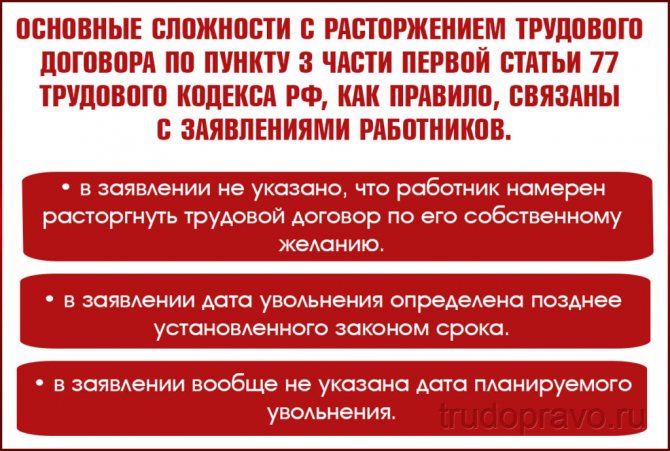
Article 77, paragraph 3, of the Labor Code states that termination of the contract is possible at the initiative of the employee. For this procedure, the employee must fill out a corresponding application, justifying his desire, taking into account Article 80 of the Labor Code of the Russian Federation.
Advantages of dismissal “by agreement of the parties”
It is clear that labor relations are a bilateral agreement, where both parties have their own status and weight, while termination of labor obligations can be initiated by one or the other party, or another option is possible: to agree and make a collegial decision that is beneficial to both.
The first, perhaps the most compromise form of terminating the relationship between an employee and an employer, is an agreement of the parties (Section No. 78 of the Code). Using this article, it is necessary to take into account that this compromise can only be applied in situations where the will of one party is not enough to terminate the contract, that is, the desire of only the employee or only the employer is not enough. A bilateral expression of will is required to sever the labor relationship.
As a rule, under article seventy-eight, a fixed-term contract is terminated before the end of its term. Or when, with a standard employment contract, both the employer and the employee have a desire to end the relationship. But the employer does not see any other way of dismissal (there is simply no reason to terminate the contract), and the person is ready to leave, but wants to receive additional compensation.
This procedure becomes optimal when it is necessary to fire an employee, but you do not want to spoil the relationship and his reputation. In this option, both parties go in the same direction when terminating their employment obligations.
In this option, the separation procedure follows the standard algorithm:
- A person submits a letter of resignation; it should be noted here that in this option this is not necessary. But if a person has determined for himself the amount of “compensation” and wants to declare this to the employer, this must be done so as not to be surprised later when he sees the final calculation note or the figure in the order to terminate the contract.
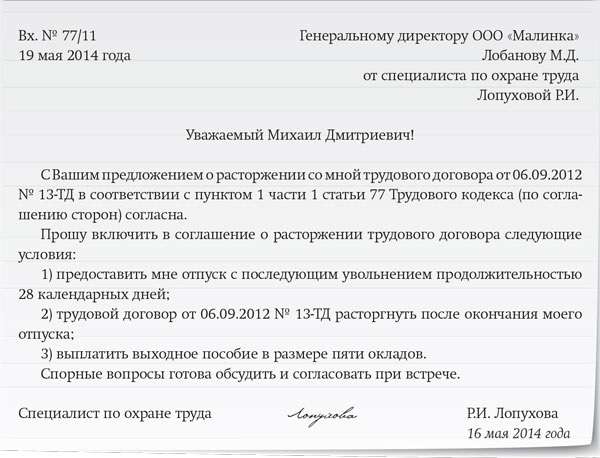
Even if the employee does not write a standard statement, he has the right to inform the employer about his claims upon dismissal “by agreement of the parties”
- A bilateral agreement is signed to complete the labor obligations. It is prepared in two copies, it states the date of departure, as well as the amount of compensation, the sequence and periods of compensation payments.
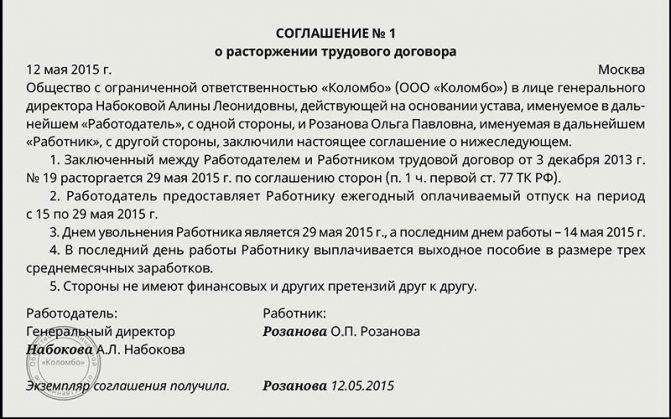
The termination agreement by agreement of the parties specifies all the necessary conditions: the period of dismissal, the amount and period of payments
- An order is being prepared, where the wording of the basis does not indicate section No. 78 of the Code, as it seems to be according to the logic of things. The correct wording looks like this: “Termination of an employment contract by agreement of the parties, clause 1, art. No. 77 of the Labor Code of the Russian Federation." The justification must include the number and date of the document signed by the parties.
- The necessary papers are prepared for the person being dismissed, calculations are made, and the following documentation is issued:
- employment history;
- order to terminate obligations;
- all documents and certificates requested by the dismissed person regarding his activities (the request for provision must be made in writing, all certificates must be issued within three days, this can be done even several years after leaving);
- standard payments - salary and payments for vacations not taken;
- additional compensation (by agreement).
The advantages of this option for the employer are:
- You can fire any employee in one day;
- In this option, the employee does not have the right to file a lawsuit for wrongful dismissal;
- guarantees that the employee does not have any material claims;
- the employee can be assigned (and he will do this efficiently) with the responsibilities for the correct transfer of affairs to the appointed responsible persons;
- All categories of workers can be fired (including mothers with children under three years of age, minors and pregnant women).
In this option, the employee receives:
- in addition to all the required payments, additional compensation - a compensation bonus (most often, this is a salary for 1-3 months);
- the opportunity to go on paid leave before dismissal;
- the right to register with the employment service and receive benefits.
We emphasize: it is possible to cancel an agreement “by agreement” (as in the case of concluding an agreement) only if both parties agree (comments can be found in paragraph No. 20 of the decision of the Plenum of the Supreme Court of the Russian Federation No. 2 of March 17, 2004).
Video: the perfect dismissal
Care at your own request - reasons and nuances
The most transparent reason for breaking the mutual obligations of the parties is dismissal at the will of the employee (section No. 80 of the Code). As a rule, this procedure follows the classic scenario:
- a letter of resignation must be submitted to personnel officers (a verbal warning is not enough);
- the employer cannot force a person to stay at work, therefore after a maximum of 2 weeks the employer must release the person from his duties;
- the counting day of the two-week period starts the next day after submitting the application;
- the period of service may be shortened, but this must be confirmed in writing (usually this is done with the help of a manager’s visa directly on the application);
- Good reasons can shorten the period of service (for example, enrollment in a university, urgent relocation), but it is necessary to indicate the reason and the desired date in the application (unlike the simple application form, where it is not necessary to indicate the reason);
- the manager, of course, can talk to the person leaving, try to convince him, offer him a different salary or additional benefits, but that’s all;
- if a person has not agreed to stay at the enterprise within 14 days, after this period the employer must pay the employee off;
- at the same time, if a person does not sign the order, does not receive a work certificate and goes to work on the fifteenth day, he remains at work (albeit, provided that the company has not yet signed a contract with a new employee for this position).
So everything is simple here. There are many reasons for this, but they all relate to personal circumstances: the person found more favorable working conditions, did not get along with his superiors or team, or was simply tired. What to hide, there are situations when an employer forces an employee he does not like to resign by threats or persuasion.
It is worth noting here that, in comparison with the justification for terminating employment obligations under the agreement, a person receives only standard payments: salary for the period worked and remuneration for vacation days not taken off.
Let's look at several nuances of termination of labor obligations under Article 80:
- under this section, you can terminate both a fixed-term employment contract and a classic one concluded for an indefinite period (termination in both cases follows the standard procedure);
- no matter where the person is at the time of writing the application (on sick leave or on vacation), the countdown of fourteen days begins from the moment the application is received by the personnel officers;
- there is one caveat here: if a person falls ill after writing an application and goes on sick leave, the employer has every right to terminate the contract with him at the appointed time, since the initiative to terminate obligations cannot be influenced by the b/list;
- when a person expresses a desire to resign while on vacation, and at the same time asks to do this before the expiration of the required two weeks, and the employer does not mind, termination is agreed upon within the period for which the person asks;
- the head of the enterprise must notify the employer of the early termination of the agreement no later than 1 month in advance (more is possible, but not less);
- temporary workers, as well as conscript employees with whom a contract has been concluded for a period of up to two months, must write a statement 3 calendar days before leaving their position.
The key thing that both parties should know is that if it is proven to those dismissed that the dismissal “on their own” was not in fact such, the termination of the contract will be considered invalid. Thus, the instructions of the Plenum of the Armed Forces of the Russian Federation No. 2 dated March 17, 2004 explain that if the plaintiff employee, when submitting an application, testifies that he was forced to write a letter of resignation, and can prove this, then the dismissal will be considered illegal. Moreover, the justification and preparation of evidence is the responsibility of the applicant. You can look at judicial practice on this topic; the main precedent for reinstatement was created by the Laginsky District Court of Elista.
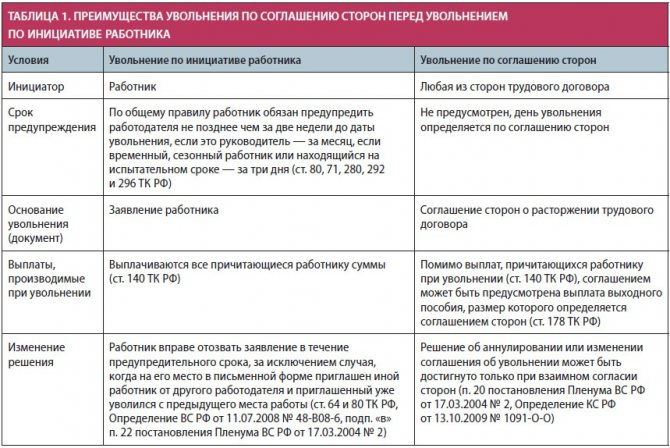
The advantages of dismissal by agreement of the parties are obvious
Dismissal initiated at the will of the employer
Termination of a working relationship at the initiative of an enterprise has slightly more nuances than the reasons listed above. All of them are addressed in section No. 81 of the Code. It should be noted that the eighty-first article is the most extensive of all the sections that reflect the grounds for termination of the contract. And this is logical, because labor legislation provides for a number of reasons that give a company the opportunity to cancel contractual obligations with an employee.
Let's consider what legal ways to fire an employee exist, what positive and negative aspects there are for both parties in this aspect.
Liquidation of an enterprise - common for dismissal
The complete closure of an enterprise, revocation of a license or bankruptcy of an individual entrepreneur, and, as a consequence, the release of all company employees from work is the result of the liquidation of the company. In this option, a company or private businessman is deprived of its legal status and completely ends its business activities, without the prospect of continuing work. The process of terminating labor obligations is reflected in the first paragraph of Article No. 81 of the Code.
There may be several reasons for closing both an LLC and an individual entrepreneur, and the reasons that led to this do not affect the process of dismissing employees; in this case, the very fact of an absolute stop of activity is important.
The framework process for terminating employment contracts during liquidation looks like this:
- after a decision on liquidation is made (or a court order is issued), all employees of the company must be notified at least 2 months in advance of the termination of their employment relationship;
- An employer closing his business is obliged to accrue standard payments to each employee, these include: salary for the period worked in the current month;
- compensation for unused vacation days;
- the first compensation is the average monthly salary (paid by the employer at the time of final payment and issuance of the labor certificate);
As a result, an employee dismissed due to the liquidation of an enterprise can receive a total of 3 average monthly salaries (severance pay + two salaries).
To receive compensation for the second and third periods, the employee only needs to present to the former employer:
- labor record, where the last entry is dismissal from this company;
- a certificate from the Employment Center, which will confirm on what day the person registered with the Employment Center.
The nuances with such a justification for the employer are that the entire staff has to be fired; they are subject to deduction from work, including preferential categories.

When an enterprise is liquidated, everyone must be fired, including beneficiaries, vacationers, pregnant women, etc.
Reduction of staff and numbers
Another reason for severing relations at the will of the employer is a reduction in staff and (or) headcount (section No. 81, part 2 of the Code).
Legislative norms distinguish between two concepts: staff reduction, when a certain position is simply deleted from the staffing table, and staff reduction, when the organizational structure remains the same, but the number of people is reduced. Often, when downsizing, both the first and second options take place simultaneously: positions are removed, and at the same time the number of personnel is cut.
The procedural aspects of terminating obligations on this basis are close (but not similar) to the first scenario:
- the person must be warned 2 months in advance about the upcoming reduction;
- the employer must report the layoff to the employment service and the trade union;
- compensate the employee for the required compensation (max 3 average salaries).
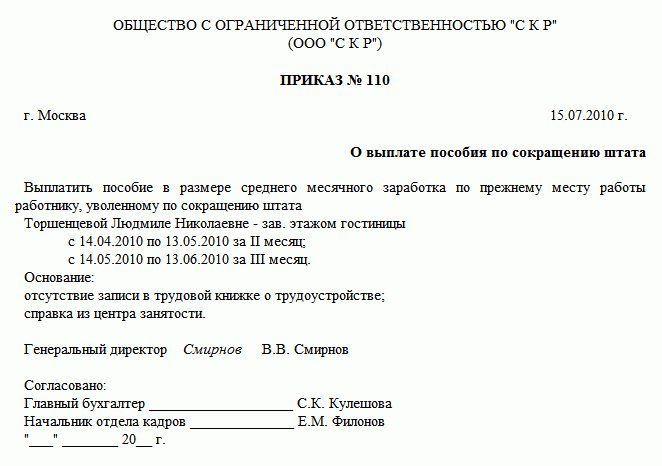
A sample order for the payment of severance pay in the event of a layoff may look like this
Please note that in this option there are significant points that distinguish this procedure from liquidation:
- you need to additionally notify the trade union (if any) of the layoff;
- the company is obliged to offer the employee another position (usually for a lower and lower-paid position) by means of a notification, under a personal signature, and only after refusing the offered position can a dismissal order be issued;
- In this case, the personnel officer or entrepreneur must take into account the so-called pre-emptive right of the employee to retain his place (Article No. 179 of the Labor Code of the Russian Federation), this requirement states that, first of all, employees with lower qualifications and productivity should be subject to layoffs, and the competencies of “controversial” employees must be documented (reports, recorded incentives, etc.);
- and another important point - during layoffs, there are certain groups of workers who cannot be fired.
When creating lists, you need to know that labor standards prohibit terminating a contract:
- with pregnant women and mothers who are on maternity leave for up to three years;
- with those who are on vacation or on leave;
- with single mothers.
And know: if the organization has staff positions that include part-time workers, these positions are considered vacant, therefore, the employer must offer them to employees who are subject to layoffs. Judicial practice is replete with variations when people were reinstated on this basis
Another point that needs to be taken into account when making redundancies is that when making redundancies, labor legislation obliges the employer to give preferential rights to certain categories of employees, these include:
- employees if their family has 2 (or more) children;
- workers who have dependents, and only they bring wages to the family;
- employees who received work injuries while performing work for this employer;
- persons who are studying (or have already undergone advanced training) at the expense of the company.
You need to know that, as in the case of liquidation of a company, the employer has the right to terminate the contract before a two-month period from the date of notice of dismissal, if the parties agree to pay additional (not included in the classic compensation) compensation, calculated in proportion to the remaining time. Moreover, this must be confirmed in writing by the dismissed employee.
Change of owner
A common reason for dismissing employees is a change in ownership. We will not dwell on this issue for long, but it is worth saying in a nutshell about the features of this foundation:
- termination of the contract in this case applies to the management team: directors of the company, their deputies and chief accountant;
- dismissed persons in this case receive increased compensation for 3 - 6 months (it all depends on the agreement with the employer and owners);
- In this case, the work book records the termination of the contract under Article No. 81 (clause 4 of the first part).
Dismissal “under article” - nuances and pitfalls
A large block of reasons for dismissal is contained in the third, fifth and sixth paragraphs of Article No. 81, in the so-called grounds “under the article”. Any indication of the points and sub-points of these grounds for termination can greatly affect both the salary and the person’s job responsibilities subsequently; often people with such entries in the employment record are not hired for normal work at all.
Reason: inconsistency with the position
Article No. 81, paragraph 3, subparagraph “b” of the Labor Code of the Russian Federation (insufficient qualifications) defines one of the reasons for dismissal as the employee’s inadequacy for the position held, his incompetence. This fact must be confirmed by the results of the certification commission initiated by the employer.
It should be taken into account that labor legislation always sides with the employee if the certification was not carried out at the proper level, especially if it was not carried out at all.
One of the key requirements imposed on the organization in this case is that, as in the case of staff reduction, the employer is obliged to offer the employee another place, as is usually the case, a lower-ranking and/or lower-paid position.
If the contract with the employee was terminated under the third paragraph of part one of Article No. 81, the organization must provide justifications and evidence that would indicate that the dismissed person refused to be transferred to another job corresponding to his qualifications. That is, there must be a written refusal of the proposed vacancy.
At the same time, the basis of “inconsistency” is similar to dismissal “due to reduction” in terms of providing a choice to the person with whom the relationship is being terminated. In both cases, if the company does not have a real opportunity to offer an employee any vacant position, this is indicated in a special notice.
The reason for removing a person from his position may also be his state of health.
The list of documents to justify dismissal under the article “non-compliance” looks like this:
- conclusion of the certification commission, which indicates the points for which a person cannot perform his duties efficiently;
- employee job description;
- notification offering new job responsibilities;
- employee’s refusal to accept another position offered to him.
Reason: repeated failure to fulfill job duties
This is the most severe option for the employee. The more difficult it is for the employer to act on such grounds. In this scenario, strict adherence to all formalities is mandatory. For this purpose, the Labor Code of the Russian Federation has a specific article No. 192, which states that disciplinary sanctions include:
- remark (must be in writing);
- reprimand (documented);
- dismissal for appropriate reasons.
If an employer wants to dismiss a person for such a reason, he must create documented prerequisites for terminating the contract. That is, all misconduct must be recorded, for each fact there must be witnesses to disciplinary violations, it must be proven that the person did not fulfill his job duties, was incompetent, violated the regime or safety rules in the workplace. This is the employer’s responsibility; the person does not have to prove anything.
At the same time, it is possible to dismiss an employee who has committed a violation only within one month after the fact has been proven.
Let's figure out what documents can confirm the fact of repeated failure to fulfill official duties (the basis is Article No. 81, clause 5 of the Code):
- acts endorsed by at least two witnesses, which record the commission of disciplinary offenses by a person;
- memos from employees and management;
- explanatory notes from the offending employee;
- orders to apply disciplinary sanctions to the employee.
It is important for both parties: the employer has the right to deprive a bonus, issue a reprimand or reprimand and dismiss “under the article” even if the person submitted a letter of resignation of his own free will. Labor law rules here determine that the relationship between the employee and the employer ends only after two weeks have passed after the application is submitted. Therefore, violations committed during work can be qualified and accepted for dismissal under “bad” articles.
Serious employee misconduct as grounds for dismissal
The next difficult paragraph of Article No. 81 - the sixth and all its subparagraphs - define the grounds for dismissal as a one-time serious violation by an employee of his duties and labor discipline, these include:
- Absenteeism is when an employee is absent from work without a valid reason for more than four hours. In this case, he can be immediately fired “under the article” (clause 6, subparagraph “a”). Moreover, the period given to the employer for dismissal under this article is generally accepted for article No. 81 - 1 month from the date of its commission.
- Being at work while intoxicated or under the influence of drugs or other substances. In this case, the dismissal takes place in accordance with subparagraph “b”: if possible, a medical examination is carried out, a report is drawn up and endorsed, etc.
- In the case when an employee deliberately ignores the rules and regulations of labor protection, which can lead to serious consequences both for the organization and for the lives of colleagues (such offenses are recorded by a special commission on labor protection, which should be in every enterprise with 10 or more people) .
- An employee can be fired if he discloses a trade secret that he learned while performing his official duties, especially if it caused financial harm to the organization.
- Failure by an employee to fulfill his job functions if his record already includes disciplinary sanctions.
- There are special cases, for example, when a teacher, educator or coach, working with children, commits immoral acts that are incompatible with his status.
In these cases, the employer needs to know that if a decision is made to dismiss a person on these grounds, it is necessary to issue an order to terminate the contract as quickly as possible, since the entire time the person was absent from the workplace, he has the right to receive his salary, and vacation days will be accrued to him etc. If, during the settlement, he brings a claim for “forced” absenteeism, the court may take the side of the dismissed person.
Documents that confirm the correct decision to dismiss for absenteeism:
- an act indicating that the person was absent from work;
- explanatory note from the employee;
- an act recording that a person refused to give an explanation for his misconduct.
The following will be able to confirm the fact of appearing (even on the territory of the enterprise, even in the last few minutes) at the workplace drunk or on drugs:
- medical examination;
- an act confirming that the employee was intoxicated at work;
- explanatory note from the offender.
Another reason for severing an employment relationship is the employee’s criminal actions against the employer, including causing financial harm to the organization. It could be:
- embezzlement of funds, damage to company property, as well as theft - those actions that cause damage to the company;
- loss of trust (clause 7 of the first part of Article No. 81) - this clause applies to persons who caused financial damage to the employer while in certain positions that imply inventory liability.
- and the final point of this chapter, according to which the employer has the right to terminate the contract with the employee, is the provision of false information about himself during employment.
You need to understand that dismissal due to theft or embezzlement is recognized as legal only when a court decision comes into force. Therefore, for example, having in hand an act of private security that recorded the fact of theft, the employer will not be able to justify the legality of the decision to dismiss the employee who stole theft, since this service does not have the right to apply administrative penalties.
Features of calculation upon dismissal
According to Art. 77 clause 3 of the Labor Code of the Russian Federation, either party can terminate the contract. In this case, regardless of whose initiative the agreement is terminated, a mandatory payment will be made. The procedure for this procedure is prescribed in Art. 140 Labor Code of the Russian Federation.
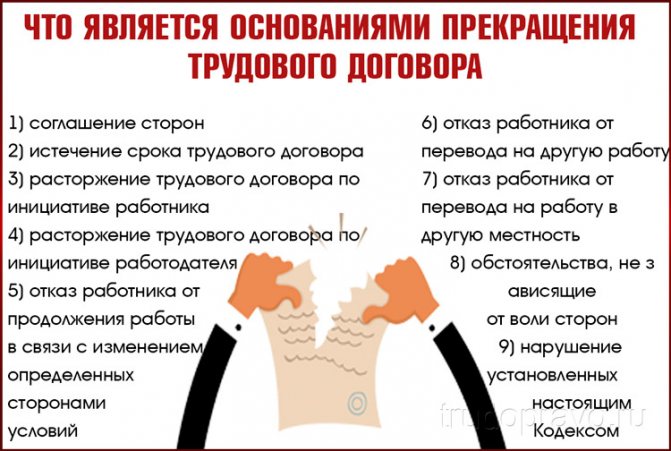
The legislation states that settlements with an employee for mandatory payments are carried out on the day of his dismissal. These include the following:
- An employee’s salary for days, hours or months worked, as agreed in the employment contract.
- Compensation for partially worked or unused vacation days.
- Compensation for dismissal if there is a reduction in staff.
The list of grounds on which compensation for termination of a contract is included in the mandatory payment is specified in Article 81 of the Labor Code of the Russian Federation, part 1 and part 2. In addition to funds in the form of salary and vacation pay, the dismissed citizen receives the following list of documentation:
- certificate of form 2-NDFL according to the sample;
- data on your salary for one month (in some cases for 3) for future processing of benefits;
- work book with the corresponding entry.
If desired, the employee has the right to demand copies of orders to terminate the contract and various certificates, for example, about insurance premiums. To receive them you need to fill out the appropriate applications. The above requirements are mandatory, regardless of the reason for which the contract is terminated.
At your own request
If an employee decides to resign on his own initiative, this means that he must submit a written application in the appropriate form. In this case, the employer reviews this document. The employer has the right to assign two weeks of work if the employee does not indicate the reasons why he wants to terminate his employment obligations.
If the argument is health status, then the application must be supported by a medical certificate. The personnel service creates an order on state form No. T-8, which indicates a comment in accordance with which article of the labor code the dismissal is carried out. After this, the employee signs this document and settlement is made with him: salary, compensation for vacation and debts of the enterprise (if any).
By abbreviation
In the face of the need to reduce staff, the employer is faced with the task of dismissing an employee in accordance with the labor code. Article 81 of the Labor Code of the Russian Federation states that in this case the company does not have to indicate the reasons for the reduction and coordinate its decision with the trade union organization. The reason for taking measures to liquidate the staff may be the poor financial condition of the organization or other indicators.
When dismissal is initiated by the employer, an order is also signed in accordance with state requirements. After the document is signed by the employee, the dismissed person is paid a mandatory payment: salary, compensation for vacation, severance pay in accordance with Article 178 of the Labor Code of the Russian Federation.
It is important to know! Also in the Labor Code, in articles 296 and 292, a special system of assistance is prescribed for the reduction of seasonal personnel and persons who have worked for less than 60 days. The employer pays the average monthly salary to the employee for 3 months in the form of severance pay if there was a reduction in the number of staff at the initiative of the enterprise.
Severance pay
In certain situations, the list of which is specified in Article 178 of the Labor Code of the Russian Federation, the dismissed employee is entitled to severance pay. This assistance from the organization provides the citizen with funds for a period of up to 2-3 months or until the dismissed employee gets a job with another employer.
There are two categories of severance pay. If an employee is not suitable for the position, is called up for alternative or military service, or is dismissed due to a change of address of the company, then he is entitled to payments in the amount of earnings for two weeks of work. In case of liquidation of an enterprise or reduction of staff - monthly average. The probationary period is not taken into account in the practice of paying severance pay.
Unused vacation
Some values in the calculation are carried out both when the contract is reduced and when the contract is terminated on the initiative of one of the parties. For unused vacation days, compensation is paid in any case, regardless of the reason for dismissal. To calculate the amount you need to do the following:
- Carry out calculations to determine the employee’s length of service at the enterprise.
- From the amount received, you must subtract the vacation days without pay used by the employee.
- This number is divisible by 28.
- The amount of paid vacation pay is subtracted from the resulting value.
The value after these calculations is the number of days for which the dismissed employee is entitled to monetary compensation, as for unused vacation.
Dismissal when the employment relationship cannot be maintained
The specificity of Article No. 79 of the Labor Code of the Russian Federation, which considers dismissal upon termination of a fixed-term agreement, is that, even after concluding a contract with a certain period of validity, the employer must warn the employee about the upcoming dismissal at least 3 calendar days in advance, and in writing.
However, the employee does not have the right to demand an extension in this case, regardless of how his work is assessed.
However, in the case where the term of the cooperation agreement has expired, but neither party has declared the termination of the relationship, and the employee continues to work, in this situation the urgent nature of the agreement ceases. The next day after passing the milestone, the employment contract is recognized as concluded for an indefinite period, and its subsequent termination is possible strictly on a general basis.
Another point is when an employment contract was concluded for the duration of the performance of official duties of a temporarily absent employee. In this option, the person may not be warned; the day the contractual obligations end will be the day the permanent employee goes to work.
Labor legislation has a large list establishing cases when, regardless of the will of the parties, a contract between two parties to the labor process must be completed; such reasons, according to Section No. 83 of the Labor Code of the Russian Federation, include:
- if the employee is drafted into the army or sent to alternative service;
- when the labor inspectorate or court makes a decision that an employee who previously held this position should be reinstated to a certain position;
- arrest and sending of an employee to a colony when, due to a court verdict, the employee cannot continue his work;
- if the medical commission has recognized that the person can no longer work;
- death of an employee or private entrepreneur-employer;
- force majeure, catastrophes and natural disasters (if recognized by the Government of the Russian Federation);
- disqualification of a person, which prohibits a person from engaging in certain types of activities, deprivation of a license or termination of special rights (for example, a driver’s license to carry a weapon, etc.
The impossibility of continuing the contract is also established:
- if it turns out that a person does not have the right to hold a certain position or engage in certain activities (Article No. 84 of the Labor Code of the Russian Federation);
- if he does not have sufficient education, and during employment they were provided with fictitious documents;
- if for medical reasons an employee is prohibited from performing a certain type of activity, etc.
Refusal to work and dismissal
Labor legislation clearly defines the reasons when an employer has the right to demand from an employee either a transfer to another position or termination of an employment contract, such grounds include the following circumstances:
- Refusal of an employee to transfer to easier working conditions, which are indicated for him on medical grounds, while there are 2 options for getting out of the situation for both parties: in the case of medical reasons. testimony requires a transfer for up to four months, the employer must remove the person from work, but at the same time retain his job (Part 2 of Article 73 of the Labor Code of the Russian Federation);
- if the movement involves a period of four months or more, then the contract is terminated on the basis of clause No. 8 of part one of Article No. 77.
Video: transfer and dismissal of an employee in accordance with a medical report (Article 73)
Awareness of the principles and main differences of various grounds for termination of employment relationships often allows a person to significantly improve his financial situation upon dismissal. Or at least get out of a stressful situation with honor. The employer is simply obliged to know the basic principles of formalizing the termination of employment contracts.

Vitaly Sazonov
Lawyer, author of articles on legal topics. Education: state educational institution of higher professional education "Moscow State Open University".
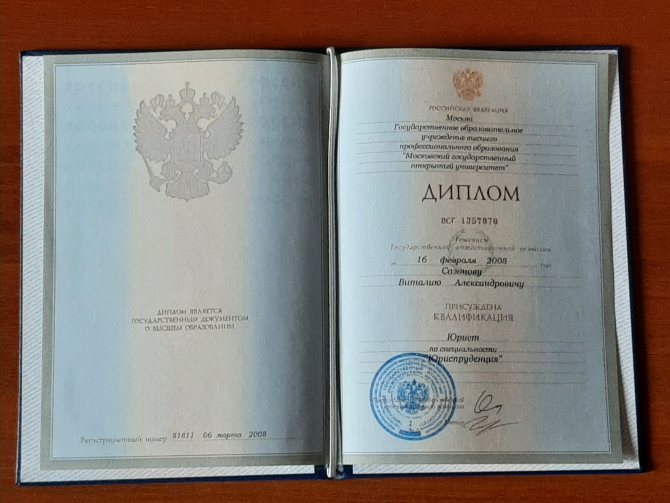
Introduction to the employment contract
In order to fulfill a set of conditions that are prescribed in the code and laws, a special document is signed in the form of an agreement between the employer or his representative and the employee. In the Labor Code of the Russian Federation, this paper is called an employment agreement or contract. These include the following types:
- An agreement to hire for an indefinite period of service.
- A fixed-term contract, which specifies the period for which the worker will be hired, but not more than 5 years.
- Contract based on the scope of work performed.
- Long-term agreement – hiring an employee in accordance with federal laws; in some regions the permissible period is more than five years.
This type of documentation specifies the nature of the employment relationship, as well as all the terms of the agreement between the hired employee and the management. The termination of this document is indicated by Article 77 of the Labor Code upon dismissal. When the end of the agreement is approaching, the employer is obliged to notify the employee in advance. According to the law, three days before the procedure.








